

Why You Shouldn't Drink Warm Bottled Water. Photo by Henrik Sorensen/Digital Vision/Getty Images A few years back, rumors circulated that Sheryl Crow claimed drinking bottled water left in a hot car had given her breast cancer.
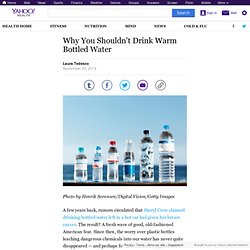
The result? A fresh wave of good, old-fashioned American fear. Since then, the worry over plastic bottles leaching dangerous chemicals into our water has never quite disappeared — and perhaps for good reason, suggests a new study published in the September edition of Environmental Pollution. Scientists from Nanjing University in China and the University of Florida investigated the effects of storing 16 brands of bottled water (all sold in China) at three temperatures: 39 degrees F, 77 degrees F, and 158 degrees F, intended to mimic the temperatures of a refrigerator, a standard room, and the inside of a car, respectively.
Related: Why Ramen Noodles Could Cut Your Life Short. Company takes action after dental hygienist’s discovery. What Are Those Parabens Doing In My Tortilla? A package of corn tortillas listing propylparaben as an ingredient.
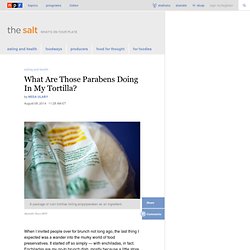
Meredith Rizzo/NPR hide caption itoggle captionMeredith Rizzo/NPR A package of corn tortillas listing propylparaben as an ingredient. Meredith Rizzo/NPR When I invited people over for brunch not long ago, the last thing I expected was a wander into the murky world of food preservatives. The tortillas are made only from corn, salt and lime, the same way they've been made for hundreds of years. "We make 1,000 tortillas a day," Karen Ponce of Moctec informed me when I called there recently. But the day before my party, I discovered my neighborhood place had stopped carrying Moctec tortillas.
My options were a far cry from the Moctec tortillas I'd grown to love. Parabens are chemical preservatives, and I've spent years trying to avoid them in beauty products and sunscreen. No More Bromine: Coke, Pepsi Drop Controversial Ingredient : The Salt. Chalk up another win for citizen activists.
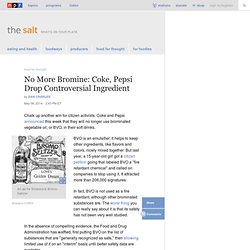
Coke and Pepsi announced this week that they will no longer use brominated vegetable oil, or BVO, in their soft drinks. hide captionAn ad for Emerson's Bromo-Seltzer. Bettmann/CORBIS An ad for Emerson's Bromo-Seltzer. BVO is an emulsifier; it helps to keep other ingredients, like flavors and colors, nicely mixed together. Www.absciex.com/Documents/Downloads/Artificial sweeteners API 3200_AB SCIEX_2170611-01.pdf. Someday Soon You May Swallow A Computer With Your Pill. Hide captionThe company Proteus has developed a computer that attaches to a pill and tracks the pill's absorption into the body.
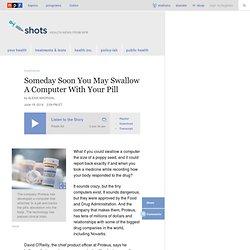
The technology has passed clinical trials. iStock The company Proteus has developed a computer that attaches to a pill and tracks the pill's absorption into the body. The technology has passed clinical trials. What if you could swallow a computer the size of a poppy seed, and it could report back exactly if and when you took a medicine while recording how your body responded to the drug? It sounds crazy, but the tiny computers exist. David O'Reilly, the chief product officer at Proteus, says he believes that someday soon every single pill a doctor prescribes will come with an electronic component embedded right in it that tracks the pill's absorption in your body. How Does It Work? Let me step back for a minute to explain how it all works. It also can't be made of anything weird or harmful. 'Natural' Food Sounds Good But Doesn't Mean Much. Hide captionAdvocates say consumers may assume that the "natural" label is the same as "organic.
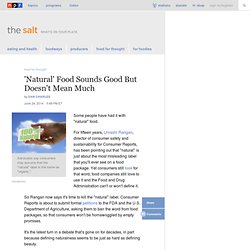
" iStockphoto Some people have had it with "natural" food. For fifteen years, Urvashi Rangan, director of consumer safety and sustainability for Consumer Reports, has been pointing out that "natural" is just about the most misleading label that you'll ever see on a food package. Yet consumers still look for that word, food companies still love to use it and the Food and Drug Administration can't or won't define it. Genetically modified food controversies. The genetically modified foods controversy is a dispute over the use of foods and other goods derived from genetically modified crops instead of conventional crops, and other uses of genetic engineering in food production.

The dispute involves consumers, biotechnology companies, governmental regulators, non-governmental organizations, and scientists. The key areas of controversy related to GMO food are whether such food should be labeled, the role of government regulators, the objectivity of scientific research and publication, the effect of genetically modified crops on health and the environment, the effect on pesticide resistance, the impact of such crops for farmers, and the role of the crops in feeding the world population.
Public perception[edit] Social science surveys have documented that individuals are more risk averse about food than institutions. Religious groups have raised concerns over whether genetically modified food will remain kosher or halal. Reviews and polls[edit] Some Food Companies Are Quietly Dumping GMO Ingredients. Hide captionGeneral Mills' original Cheerios are now GMO-free.
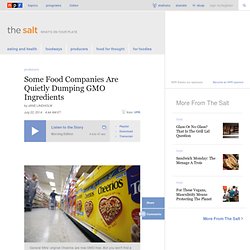
But you won't find a label on the box highlighting the change. David Duprey/AP General Mills' original Cheerios are now GMO-free.